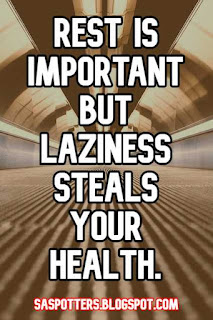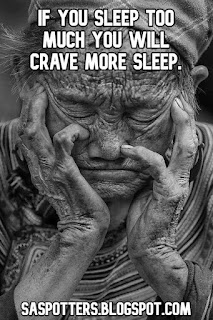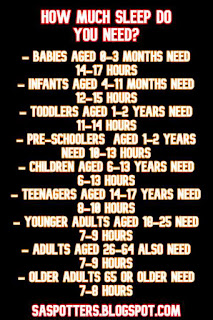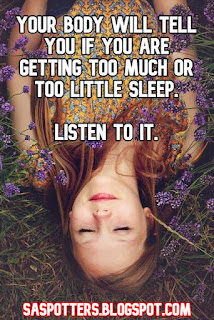 |
| Don't sleep more than you need. |
Can you sleep too much?
Yes, you can sleep too much. You can sleep so much that it harms your mental, emotional and physical health. Oversleeping can even be addictive. Our brains, bodies and emotions need enough stimulation every day to function properly.
I had a client who had a very slow metabolism because she slept more than she needed to. She used to lie in her bed for hours before falling asleep as an escape from the things that she didn't like. Her bed was her comfort zone.
Her body was not used to a lot of physical activity or mental stimulation. This made it hard for her to lose weight. She therefore struggled to keep up with everybody else without the need for constant rest.
 |
| Too much is not good. |
Health risks of sleeping too much
1. Diabetes
2. Heart disease
3. Increase chance of death
4. Metabolic disorders
5. Obesity
6. Mental decline
 |
| You need physical stimulation. |
We’ve all heard that not getting enough sleep leads to serious health problems like a weakened immune system, deteriorating mental health and declining heart health.
Irregular sleeping patterns are also harmful because they decrease your body’s ability to get a good night’s sleep at the right time.
Sleeping too much can also lead to serious health complications.
According to WebMD sleeping too much can lead to diabetes, heart disease and increased chance of death.
The Sleep Doctor explains that oversleeping is a sign of disordered sleep and that it is linked to the same kinds of health risks as sleeping too little.
These health risks include heart disease, metabolic disorders like diabetes and obesity and declining mental performance.
How can sleeping too much affect my health?
Our bodies work on a daily sleep cycle known as the circadian rhythm.
This rhythm cycles through periods of wakefulness and sleep, with a complete cycle completing at around 24 hours.
Within this cycle, periods of wakefulness and sleep should balance each other out.
Cortisol (stress) levels rise in the morning and slowly taper off throughout the day until they reach their lowest before sleep.
Too much or too little cortisol will negatively affect muscle tissue. People with chronically low levels of cortisol suffer with constant fatigue and lack of energy.
You need sleep and rest to decrease cortisol levels. You need physical activity and mental stimulation in increase cortisol levels.
Certain hormones are released during sleep, while others are stimulated during wakefulness.
Hormones that are affected by the sleep cycle include insulin (weight gain), ghrelin (hunger) and leptin (satiety).
 |
| You need sleep and wakefulness. |
Sleeping too much can be the result of other unhealthy factors
Too much sleep can be caused by
WebMD notes that the negative health affects linked with sleeping too much could be caused by other factors – for which needing more sleep is simply another symptom.
These factors include depression, low socioeconomic status and undiagnosed illnesses like heart disease.
According to this logic, it is not sleeping too much that poses the health risk, but the health factor that is causing you to sleep more than usual.
 |
| Check your health. |
I strongly believe that regularly sleeping for longer than you need poses health risks of its own. Here are the reasons why:
Sleep can be addictive
Many would argue that you can’t be addicted to something that you need to survive.
I don’t believe this, since many people are addicted to chemicals which our brains should make automatically.
The hormone melatonin is needed for survival, but medication containing melatonin can become addictive. Food, sodium, sugar and exercise addictions are also common.
One of the major elements of addiction is escapism, and sleep can serve as a viable route to escape your current situation instead of dealing with it. I had a client who had this issue. The only time that they felt at peace was during sleep.
The rule of diminishing returns, another major element of addiction, also plays a role in making sleep addictive.
The more you sleep, the less the quality of your sleep will be. This is one of the premises on which the polyphasic sleep system was built.
If you increase the amount of time that you sleep to more than what you need, your body will take more time to perform important functions during sleep.
Under-sleeping often leads to cravings for foods high in fat, while sleeping too much often leads to cravings for more sleep.
We can all think of days off when we’ve slept too much and wanted to do nothing else but lay under the covers for even longer.
 |
| You want more than you need. |
Too much sleep reduces mental stimulation
If you exercise too much, you risk damaging your body instead of building it up. If you exercise too little, the long periods of rest in between workout sessions lead to atrophy (muscle breakdown) before muscles are once again stimulated.
Our brains also cycle between periods of stimulation and recovery. If recovery times are increased too much while stimulation periods are decreased as a result, the rule of atrophy will decrease mental performance.
Regular mental stimulation is important for optimal brain health. Lack of mental stimulation can lead to mental diseases like depression, dementia and schizophrenia.
 |
| You need mental stimulation. |
Sleeping too much decreases caloric expenditure, leads to weight gain and slows your metabolism
Our bodies spend the least amount of calories while asleep.
We keep our bodies in the same position for long periods of time during sleep.
Caloric expenditure is very important for metabolic stimulation and, therefore, health.
Think about how people get bed sores or struggle to walk normally if they are stuck in bed for too long without movement and blood flow.
Decreased overall caloric expenditure can lead to diabetes, heart weakness, low energy and hampered physical endurance.
 |
| Move enough. |
How much sleep do we need?
The average person needs around 8 hours of sleep a day. The National Sleep Foundation, though, has extended the average range to 7-9 hours of sleep a night.
This daily average can vary for a variety of reasons.
Different age groups need different amounts of sleep
A new born baby’s sleep requirement can’t be compared to that of an adult’s.
The National Sleep foundation has broken down (and revised) the average amount of sleep that humans need at different stages throughout our lifespans.
Sleep need according to age
• Babies aged 0-3 months need an average of 14-17 hours of sleep daily
• Infants aged 4-11 months need an average of 12-15 hours of sleep daily
• Toddlers aged 1-2 years need an average of 11-14 hours of sleep daily
• Pre-schoolers aged 1-2 years need an average of 10-13 hours of sleep daily
• School age children aged 6-13 years need an average of 6-13 hours of sleep daily
• Teenagers aged 14-17 years need an average of 8-10 hours of sleep daily
• Younger adults aged 18-25 need an average of 7-9 hours of sleep daily
• Adults aged 26-64 also need an average of 7-9 hours of sleep daily
• Older adults aged 65 or older need an average of 7-8 hours of sleep daily
There is another factor that makes this a little more complicated: Some people naturally need more sleep than others, while others need less.
There are people who need more sleep than usual
Sleepfoundadtion.org names people who need more sleep than average long sleepers.
According to them, these people sleep more than the average requirements of people in their age group.
They have (or require) average nightly sleep durations of around 10-12 hours.
Sleep Foundation explains that this is a disorder that forms at childhood and turns into a life-long pattern that lasts throughout adulthood.
Besides their need for more sleep than average, these people have sufficient energy throughout the day as long as their sleep requirements are met.
The extended sleep requirement is not caused by other medical complications. The only common complaint among these long sleepers is that they feel that there isn’t enough waking hours in their day.
PLOS Genetics studies the connection between sleep length requirement and genes.
According to the study, many genes appear to be involved and the study suggests that "sleep duration in natural populations can be influenced by a wide variety of biological processes, which may be why the purpose of sleep has been so elusive."
There are also people who need less sleep than usual
The University of California San Francisco explains that genetic makeup can potentially reduce the amount of sleep that people need.
UC San Francisco neurology professor Ying-Hui Fu, PhD, found a mutated DEC2 gene in a family of people who sleep for short periods of time.
They typically sleep at 11-12pm and wake up naturally at 5am. “These are not people who’ve trained themselves to wake up early. They’re born this way,” says Fu.
These people do not have negative health effects or diminished mental performance from getting less sleep – they just need less of it to recover and feel refreshed.
How do you know if you are sleeping too much?
We all need different amounts of sleep, and the amount that we need is largely determined by our genetics.
This makes it harder to determine if we are getting too much sleep, or if or we are actually giving the body what it needs.
Thankfully, there are signs that we can identify to see whether we the amount of sleep that we are getting is too much or too little.
Sleep pressure
As you stay awake for long periods of time, sleep pressure builds up and it gets harder to stay awake.
When we have low sleep pressure, we are awake and alert. When sleep pressure is higher, we feel the overwhelming desire to sleep.
Sleep pressure directly affects sleep quality. Higher sleep pressures pull the body into deeper, more restorative forms of sleep.
Sleep pressure can be divided into two categories: REM sleep pressure and deep sleep pressure.
REM sleep allows for mental rejuvenation and learning. This is the phase of sleep where you have vivid dreams as your brain tries to make sense of thoughts, experiences, memories and emotions.
Deep sleep is the phase of sleep where physical restoration takes place. Physical recovery (tissue repair) peaks during this phase of sleep.
If you stay awake for long enough, sleep pressure will build up so high that you can’t help but fall asleep.
A good measure of sleep pressure is the amount of time that it takes you to fall asleep
If you take less time to fall asleep, sleep pressure is high.
Long periods of time taken to fall asleep indicate lower sleep pressure.
Sleep pressure, subjectively measured by how much time you take to fall asleep, is a relatively good way to measure sleep need.
There are certain factors that can interfere with this method of sleep need determination, though.
Heightened stress levels, leading to increased cortisol (stress hormone) levels, can disrupt the body’s natural sleep cycle.
Cortisol makes us feel awake. It is possible to need a lot of sleep and recovery while stressing so much that you can’t get the sleep that you need.
Relaxing before bed time can decrease cortisol levels in order for us to correctly determine sleep pressure – and therefore, sleep need.
These techniques also prime the body for high quality sleep.
Caffeine, nicotine, alcohol and drugs also interfere with this process.
Mental performance and recovery
Mental and physical performance, along with the ability to adapt to new stimuli, can indicate whether we are getting the right amount of sleep.
The ability to cope with your day-to-day life can tell you whether you need to adjust your sleeping patterns.
Over-sleeping and under-sleeping often exhibit similar symptoms. For this reason, inability to cope with the pressures of life could be a sign of either too much or too little sleep.
 |
| Waking hours reflect sleeping hours. |
How do you feel throughout the day?
Self-evaluation is a great measurement to determine whether you need more or less sleep.
People who need more sleep are generally aware of this fact, along with people who need less.
Anecdotal evidence seems to rein supreme in this case, unless you can afford to get your genetic code checked out by a neurological sleep expert.
Most people know whether they are getting enough sleep.
If you feel like you are getting too much sleep (which you probably are because you are reading this article), try reducing the amount of time that you sleep to see if you feel better.
Sleep cravings
Increased cravings for sleep throughout the day can point to the fact that you aren’t getting enough sleep.
If you crave more sleep at the beginning of the day but feel a decreased need for sleep as the day goes on, you could possibly be getting too much.
Mental and physical stimulation
Mental and physical stimulation should be balanced out with sleep time and quality.
This is why exercise is vital to increase quality sleep. I actually used exercise to change my sleeping habits.
Exercise increases physical stimulation and the body’s need to rest.
Are you tipping the scale towards doing more than what you are recovering from, or resting more than what your actions require?
Sleep is vital for rest and recovery.
Too much sleep, however, can decrease the body’s ability to recover efficiently.
 |
| Balance is best. |
Stimulus is needed to even out the delicate balance between action and recovery. Stay Strong!





No comments:
Post a Comment